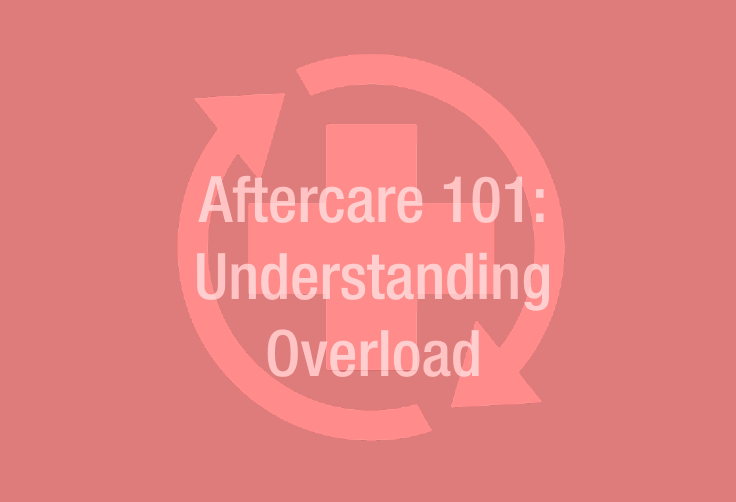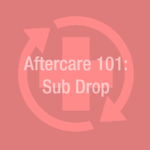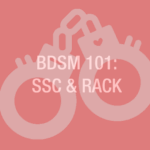🔥 When It’s Too Much: Understanding Overload in BDSM
BDSM is often described as a dance of intensity—pleasure, pain, power, surrender. But even the most seasoned players can sometimes take things too far, too fast. That’s when Overload strikes.
Overload isn’t just “not having fun anymore.” It’s a full-body, full-mind experience where the stimulation—whether physical, emotional, psychological, or sensory—exceeds a person’s ability to process it. And it can happen to anyone.
Let’s explore what Overload looks like, why it happens, and how to navigate it safely.
🌪️ What Is Overload?
In a BDSM context, Overload is the point where a person (Top or bottom) becomes overwhelmed by the intensity of the scene. It may be triggered by:
- Sensory Overload – Too much pain, sound, touch, temperature, or visual stimulation.
- Emotional Overload – Sudden vulnerability, shame, panic, or flashbacks.
- Psychological Overload – Roleplay or power exchange becoming too real, too fast.
- Energetic Overload – Absorbing too much emotional intensity from a partner (especially for empathetic players).
Overload is a limit. It’s not a failure, not a weakness. It’s your mind and body saying: “I need a break.”
🧠 How It Feels (and Looks)
For submissives, Overload may show up as:
- Dissociation or zoning out
- Uncontrollable crying or panic
- Flinching away or suddenly going non-verbal
- Trembling, hyperventilation, or collapse
- A “frozen” look—unresponsive or glassy-eyed
For Dominants, it might look like:
- Feeling panicked mid-scene
- Guilt or sudden anxiety
- Emotional shutdown or irritability
- Heart racing, lightheadedness, or nausea
- A deep sense of “I’ve lost control” or “something’s wrong”
⚠️ Why It Happens
- Pushing Too Far, Too Fast
Even with consent, a scene might escalate quicker than someone expected. Pain thresholds, emotional triggers, or intensity might catch you off guard. - Unaddressed Triggers or Trauma
Sometimes play unintentionally brushes against past wounds. Roleplay, bondage, humiliation, or impact can awaken emotions that overwhelm. - Lack of Communication
When scenes aren’t negotiated thoroughly, or a player ignores subtle signs, Overload becomes much more likely. - Physical Factors
Hunger, dehydration, illness, lack of sleep, or being intoxicated can all make you more vulnerable to Overload.
🛑 What To Do During Overload
If you’re the one overloaded:
- Use your safe word or signal immediately.
- If you’re non-verbal, use a non-verbal signal (tapping out, snapping fingers, dropping an item).
- Try grounding: breathe slowly, focus on a texture or smell, or ask your partner to guide you back with words.
If your partner is overloaded:
- End the scene immediately and gently.
- Speak calmly, remove restraints, reduce stimulation (lights, sound).
- Offer comforting physical presence only if welcome—ask.
- Provide water, a blanket, or space as needed.
- Don’t push for explanation in the moment.
💖 After the Overload
Once the moment has passed, it’s time for aftercare—and reflection.
- Reassure your partner they’re safe, cared for, and respected.
- Let them talk at their own pace. Don’t force them to explain if they’re not ready.
- If you’re the Dom and you overloaded your sub, own it. Apologize. Learn.
- If you’re the sub and you feel guilt—breathe. Consent is a living, shifting thing. You’re not “bad” for having a limit.
- Talk it through when you’re both calm. Reaffirm trust. Adjust your negotiation moving forward.
🧰 How to Prevent Overload
- Negotiate thoroughly: Don’t just cover what you want—cover what you don’t. Discuss mental and emotional triggers, hard stops, safe words, and how to check in during play.
- Use traffic-light check-ins (especially in scenes with high intensity):
- 🟢 “I’m good”
- 🟡 “It’s intense, but okay”
- 🔴 “Stop now”
- Know your signs: Learn how Overload shows up in you and your partner.
- Limit your intensity: You don’t have to go full throttle every time. Build slowly.
- Practice pre-scene grounding: Center yourself before diving into roleplay or play.
- Make aftercare non-negotiable: Always plan time to come back to earth together.
🩶 Final Thoughts
BDSM is about trust, exploration, and intensity—but it’s also about safety. Overload is the brain’s way of hitting the brakes, saying, “This is too much.” Listen to it.
There is no shame in Overload. It’s a teacher. It shows us where the edge is—and reminds us to approach it with care, respect, and love.
Whether you’re a Dominant learning your sub’s limits, or a sub learning your own voice, honoring the signs of Overload is a powerful act of mutual care.
We aren’t just here to play rough—we’re here to protect each other while we do.



